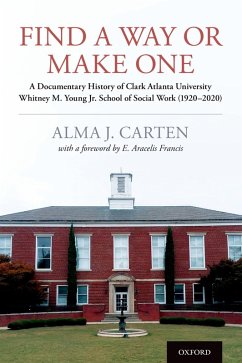Clark Atlanta University Whitney M. Young Jr. School of Social Work was founded in 1920 in Atlanta, Georgia, as the Atlanta School of Social Work to prepare social workers for practice in underserved black neighborhoods. Spearheaded by black scholars and progressive whites during an era of racial segregation, 2020 marks its centennial as the first accredited social work program at a historically black college and university. In this book, social work professor Alma J. Carten describes the School's transitions from its beginnings amid the pervasive racism sanctioned by Supreme Court rulings in the Dred Scott and Plessy v. Ferguson cases, through the decades of 20th century progressive civil rights reforms, and into the new conservatism of the 21st century. Referencing archival documents, Carten illustrates the School's commitment to the democratic principles of the profession despite the blatant racism of the segregated South and the less visible structural inequalities following desegregation from which mainstream social work education was not immune. The book describes the influence of iconic thought leaders on the School's culture and academic programs, beginning with Jesse O. Thomas's speech on the need for a black school of social work, given from the segregated section of the 1920 National Conference on Social Work; and including W.E.B. DuBois' Atlanta University Studies that pioneered the model of social progress powered by science; E. Franklin Frazier and Forrester B. Washington, who championed "black social work" and the integration of race critical content in the curriculum of all schools; and Whitney M. Young, Jr., who chastised social workers for their waning interest in advocacy for marginalized populations and encouraged them to become politically active. Carten examines the evolution of the School within the context of changes in US social welfare policy, CSWE accrediting standards, and NASW Code of Ethics. Highly readable, the book brings to light the under-reported contributions of HBCU social work programs to social work education, and it thoughtfully engages with the School's efforts to legitimize the Afrocentric perspective and the humanistic values embraced by HBCU social work programs.
Dieser Download kann aus rechtlichen Gründen nur mit Rechnungsadresse in A, B, BG, CY, CZ, D, DK, EW, E, FIN, F, GR, HR, H, IRL, I, LT, L, LR, M, NL, PL, P, R, S, SLO, SK ausgeliefert werden.


